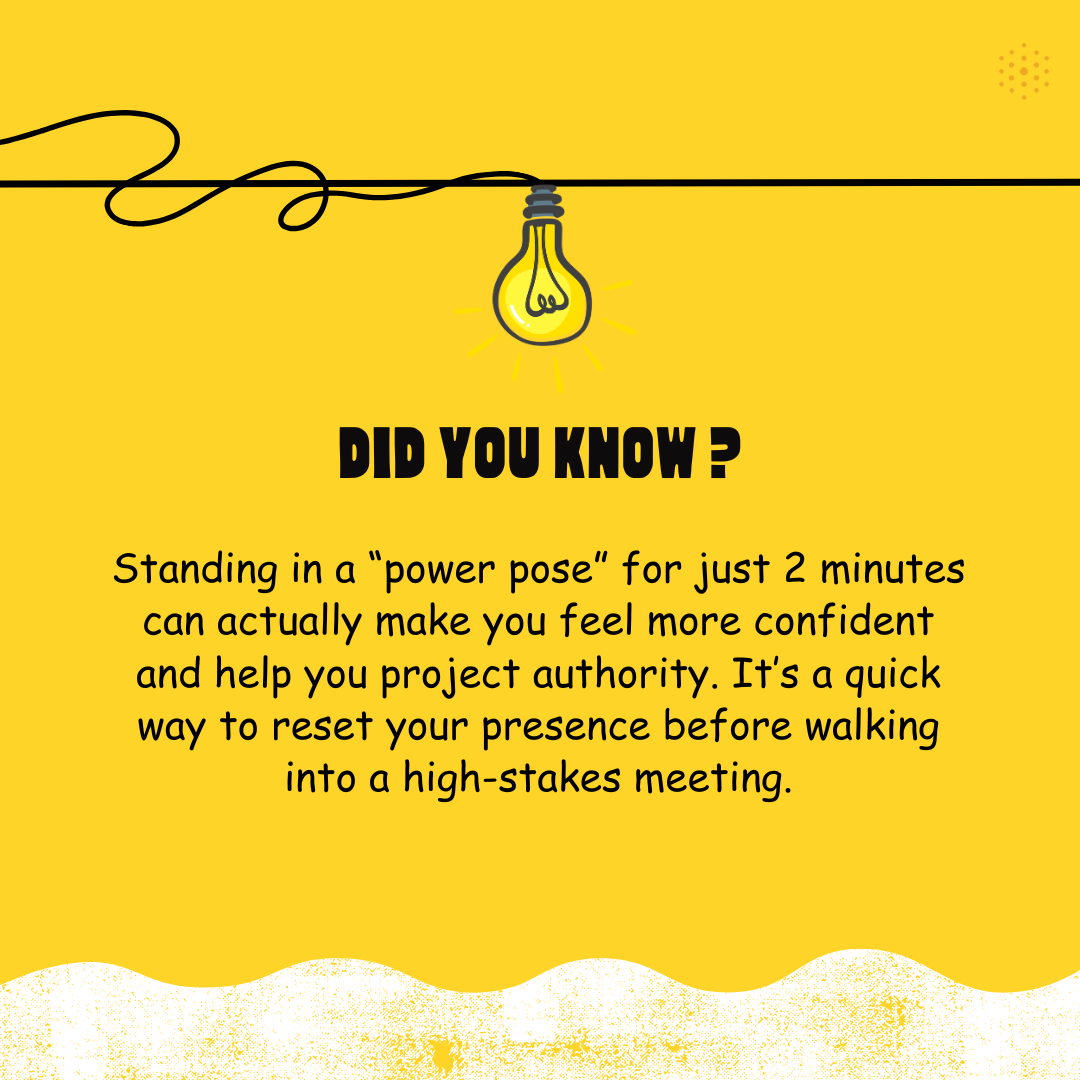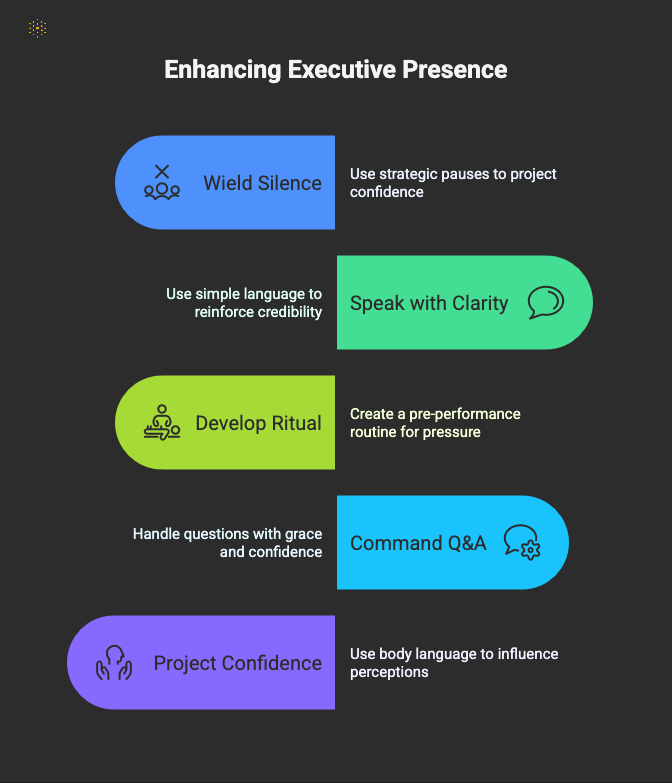67% of senior leaders say gravitas, the ability to project confidence, poise, and credibility, is the single most important quality of executive presence.
But gravitas isn’t something you’re born with.
It’s built through deliberate actions: the way you pause to command a room, navigate tough questions with calm authority, and inspire others with a clear, compelling vision.
And it sure doesn't happen overnight; it comes with strategic practice and intentional behaviors that signal confidence and inspire trust.
Here are 5 proven ways to help you cultivate executive presence and elevate your leadership impact in every high-stakes moment.
1. Wield Silence to Demonstrate Authority
Most speakers fear silence, but leaders understand its power. In high-stakes environments, rushing your words can signal nervousness, while a deliberate, strategic pause projects confidence, poise, and authority.
Research on world-class speakers shows that those who use well-timed pauses are perceived as more authentic and trustworthy, because silence gives their words weight and allows the audience to truly absorb their message.
Use silence to:
- Command Attention: When you walk into a room or onto a stage, take a moment. Stand silently, survey the audience, and make eye contact before you begin. This non-verbal cue signals that you are in control and the proceedings will begin on your terms.
- Amplify Critical Points: After delivering a key insight, perhaps a new strategic direction or a critical piece of data, pause for 2-3 seconds. Science shows this gives your audience time to process, improving retention by over 30%.
- Navigate Tough Questions: When asked a challenging question, don't rush to answer. Take a visible, deliberate pause. It gives you a moment to think and shows the audience you are thoughtful and unfazed by pressure.
2. Speak with Clarity, Not Complexity
One of the fastest ways to erode executive presence is by overloading your message with jargon, endless data points, or convoluted arguments.
Using simple, direct language doesn’t diminish intelligence, it reinforces credibility.
In fact, research shows, the most respected leaders consistently use plain language because it fosters engagement and trust. When preparing to speak:
- Strip it down: If you only had 30 seconds to make your point, how would you say it?
- Focus on one message: Pick a single key takeaway per conversation or presentation.
- Anchor it in examples: Replace bulky bullet lists with vivid stories or analogies.
By prioritizing clarity over complexity, you demonstrate that you're not only confident in your message, but confident in your audience’s ability to grasp and act on it.
Also Read: How to be confident during interviews?
3. Develop a Ritual for High-Stakes Pressure
Every leader faces moments of intense pressure, the investor pitch, the difficult board meeting, the company-wide layoff announcement.
Your ability to remain calm and confident is crucial. Develop a simple, repeatable pre-performance ritual.
- Reframe Anxiety as Excitement: Research from Harvard shows that reinterpreting anxiety as excitement can significantly boost performance. Your heart is pounding before a big presentation. Instead of thinking "I'm nervous," tell yourself, "I'm excited to share this vision and lead my team."
- Use Grounding Techniques: Before you step up, focus on your physical senses. Press your feet firmly into the floor. Feel the solidness of the lectern or table. This simple physical grounding can pull you out of an anxious thought spiral and into the present moment.

4. Command the Q&A: Handle the Hot Seat with Grace
The Q&A is where a leader's credibility is truly tested. It's unscripted, unpredictable, and your team is watching closely to see how you handle the heat.
- Welcome Dissent: Actively invite tough questions. Say, "I want to hear your challenges and concerns." This shows you aren't afraid of criticism and builds psychological safety.
- Answer the Questioner, Not Just the Question: Look the person in the eye. Acknowledge their point: "That's a valid concern, Sarah." It shows you are actively listening and respect them, even if you have to deliver a tough answer. How a leader handles these sessions is a core competency, especially for roles like HR managers, who must frequently manage difficult conversations.
- Use the Bridge Technique: If faced with an overly aggressive or off-topic question, build a bridge back to your core message. "I understand your frustration with that specific policy, and it highlights why our overall mission to improve transparency is so critical. Let me tell you the first step we're taking..."
5. Project Confidence Through Body Language
Executive presence isn’t just about what you say, it’s how you look, move, and speak that influences perceptions.
In fact, 55% of the message we convey comes from body language, and another 38% from vocal tone, leaving only 7% tied to actual words.
Even subtle shifts like standing taller, using open gestures, or steadying your tone, can dramatically change how others perceive you.
To build this awareness, tighten your feedback loop:
- Record a presentation and observe your posture: are you standing tall, facing the room, and using deliberate gestures?
- Listen to your tone: does it sound clear and confident, or does it trail off at the end of sentences?
- Watch your facial expressions: do they align with the confidence and authenticity you want to project?
Then, ask trusted peers or mentors specific questions like:
- “Did my posture stay open and strong throughout?”
- “Did my tone maintain authority during Q&A?”
By refining your nonverbal presence through intentional practice and feedback, you can transform this elusive trait into a visible and believable, executive asset. You can reinforce that impact by learning how to use ChatGPT for PowerPoint, making your messaging sharper and your slides more engaging.
Also Read: What are some of the most sought after leadership skills?

Wrapping Up
Building executive presence is about more than commanding a room, it’s about showing up with confidence in every interaction, from presentations to one-on-one conversations.
And in today’s world, your presence needs to translate just as powerfully on paper and in interviews.
That’s where Hiration can help - whether it’s refining your resume, preparing you for high-stakes interviews, or helping you present your best self across every professional moment.
Build a presence that speaks before you do!



